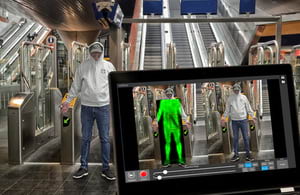The Home Office made two separate announcements this week about investing in new technology to tackle different crime problems.
On Monday, the Department announced that it has funded a trial of a new weapon scanning system at Stratford station as part “of the government’s continued drive to crack down on knife crime” (since Mr Johnson has become Prime Minister all criminal justice initiatives feature the word crackdown somewhere).
The specialised technology, made by British company Thruvision, can safely detect weapons including guns, knives and explosive devices concealed under clothing at distances of up to 30 feet.
It works by revealing objects concealed in clothing that block a person’s body heat. By using training and experience police officers will be able to identify objects that could be used as a weapon, without needing physical searches. The technology is already used on the Los Angeles Metro.
The initial 5 day trial will be run by British Transport Police, with support from the Metropolitan Police, and will look at how officers can use technology to detect if an individual is carrying a knife without causing any personal disruption, such as stopping the individual or requiring them to empty their pockets.
It will enable the Home Office, British Transport Police and the Metropolitan Police to consider whether such technologies can play a significant role in efforts to combat knife crime.
The technology enables police officers to see the size, shape and location of any concealed item. It does not show any intimate body parts and it is impossible to tell an individual’s gender, age or ethnicity from the imagery it produces.
The Home Office’s Joint Security and Resilience Centre (JSaRC) is providing approximately £40,000 to deliver the trial and will continue to explore other technologies through collaborating with other government departments and industry.
The press release also mentions the Government’s recent, controversial, decision to remove some of the restrictions around the use of “stop and search”.
The following day, the Home Office announced a much more substantial investment of £30 million in artificial intelligence to target paedophiles operating on the dark web.
Statistics from the National Crime Agency (NCA) show that last year 2.88 million accounts were registered globally across the most harmful child sexual abuse dark web sites, with at least 5% believed to be registered in the UK.
To tackle this threat, the new investment will be made in the UK’s child Abuse Image Database (CAID), a resource that provides law enforcement agencies with effective tools to search seized devices for indecent images of children, reducing the time taken to identify illegal images of children and increasing the ability to identify victims. The new funds being made available will explore adding enhanced Artificial Intelligence (AI) tools to the system, including voice analytics and age estimation.
CAID was first introduced to police forces from December 2014 and hosts 14 million images. It is a vital tool to speed up police investigations into CSEA and help safeguard the children who have been abused. State of the art new techniques being explored by the Home Office would see voice analytics added to CAID to help detect offenders and safeguard victims, as well new age estimation tools.
This builds on new £1.76 million capabilities announced by the Home Office this summer to CAID, which included rolling out a new a fast-forensic tool, image categorisation algorithms and scene matching technology. AI tools like these can be used to identify and class images, speed up investigations and take the burden of viewing images off police officers.
The funding, announced as part of the Spending Round, will build on previous resource to tackle the complex issue of offending on the dark web. Previous funding has helped expand the NCA and GCHQ Joint Operations Team, while the NCA has also established its Dark Web Intelligence Unit- a team tasked with gathering intelligence and patterns on dark web offending.



